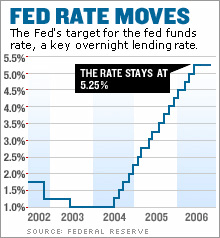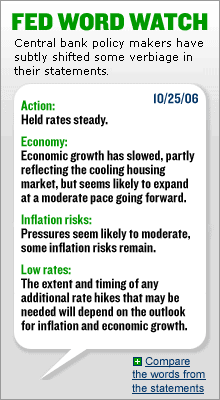The Fed that cried wolfBernanke & Co. are talking tough on inflation, but investors are still betting 2007 will bring rate cuts. Who's right?NEW YORK (CNNMoney.com) -- The Federal Reserve is talking rather loudly about inflation but many investors are sticking their fingers in their ears and pretending not to hear. The nation's central bank is meeting on Tuesday to decide what to do with the federal funds rate, an overnight bank lending rate the Fed controls that affects rates on many consumer and corporate loans.
And while most investors expect the Fed to keep its federal funds rate target steady at 5.25 percent for the fourth straight meeting, some actually expect Ben Bernanke and Co. to cut its rate target by a quarter percentage point. According to fed funds futures contracts on the Chicago Board of Trade, investors are betting on a 91 percent chance of no move by the Fed - and a 9 percent chance of a rate cut. What's more, based on contracts that will trade through next year, traders are betting that at least one rate cut is all but certain by May and that the Fed will lower rates several more times by the end of 2007. This seems odd to some market observers considering that Fed Chairman Bernanke and other Fed members have been increasingly vocal in recent weeks about inflation. "I would be in the camp that the Fed will hold their ground. I don't see how anyone can intelligently or logically expect the Fed to ease at this meeting," said Jack Ablin, chief investment officer with Harris Private Bank in Chicago. During a speech two weeks ago in New York City, Bernanke said inflation was the "predominant" risk facing the economy. He also expressed concern that if the job market continues to heat up, corporations may need to raise prices to offset higher labor costs. The Fed, and investors, found out last week just how strong the labor market is when the government reported payroll growth and unemployment for November. Employers added 132,000 jobs in November. According to a survey by Briefing.com, economists were predicting that 105,000 jobs were added to the nation's payrolls. Hourly wages increased 0.2 percent, down from October's 0.4 percent increase and below forecasts of an 0.3 percent jump. The unemployment rate edged up to 4.5 percent, from 4.4 percent in October. This was in line with expectations. But the unemployment rate is still relatively low, however, and could keep the Fed on an inflation vigil. "The jobs report is very important. It will help to tell us whether a low unemployment rate is going to stick. It's a huge surprise that it's this low. It's well below the 5 percent threshold that gets the Fed nervous about inflation," said Ethan Harris, chief U.S. economist with Lehman Brothers. Bernanke, as well as other Fed members and even former Fed chair Alan Greenspan, have also indicated in recent speeches that they think the worst of the housing market's slump is over, which should be good news for the economy. Many have feared softness in housing could dampen consumer spending and send the overall economy into a tailspin. But when the Fed is more worried about inflation than an economic slowdown, that typically means the central bank is more likely to raise rates, not lower them - or at least hold them steady until the inflation picture is clearer. "Nobody believes the Fed. They are trying to do their job and their mandate is to battle against inflation," said John Lynch, chief market analyst with Evergreen Investments in Boston. But stock traders still are banking on rate cuts in the near future. Some have argued that the recent rally in stocks has been fueled by hopes that a slowing economy will cause the Fed to cut rates next year, which should boost profit growth. And the bond market is also betting on lower rates. The yield on the benchmark 10-year Treasury stands at 4.51 percent, down from the high for the year of 5.24 percent, hit in July. Long-term rates are now significantly lower than short-term rates, a phenomenon known as an inverted yield curve, which has been a harbinger of a recession. Harris and Lynch both said they believe investors overreacted to a report two weeks ago that showed manufacturing activity is slowing. Phil Dow, director of equity strategy with RBC Dain Rauscher in Minneapolis, added that the bond market seems to have its mind made up that the economy is softening - and that may be premature. Dow thinks the Fed is wisely taking a wait-and-see stance toward the economy. If the housing and labor markets show more signs of sustainable improvement, it's going to be tougher to argue that the economy is in trouble, even with weakness in manufacturing. "Either the Fed is wrong or the bond market is wrong and I don't know who it is yet. But my guess is that the economy will end up more robust than most people think," he said. Housing, however, is the big wild card. If the real estate market hasn't bottomed out, the Fed may be forced to lower rates. "We could have a rate cut next year if we see persistent weakness in housing," said Evergreen's Lynch. But Brian Stine, investment strategist with Allegiant Asset Management Co. in Cleveland, said that because long-term rates, which influence mortgage rates, are low, the housing market could reignite next year and increase inflation pressures. So instead of worrying about whether rate cuts are needed to avoid a recession, Stine said the Fed would be wise to hold steady for the foreseeable future so there's no need to raise rates next year in case economic growth is stronger than expected. "We could have a touch-and-go landing where the economy recovers sooner rather than later and the Fed may have to hike rates if we have fairly healthy growth," he said. Still, some think the market is correct to assume the Fed will cut next year. Mark Zandi, chief economist with Moody's Economy.com, a research firm, said he thinks core inflation, which excludes the cost of food and energy, will probably dip below 2.5 percent as the year progresses. That should make the Fed more comfortable that it has inflation in check. However, Zandi thinks the Fed probably won't act until later in the year. "It's reasonable to expect rate cuts next year but it won't happen until inflation is within the Fed's targets," he said. Keith Hembre, chief economist with First American Funds in Minneapolis, said the unemployment rate is likely to inch up next year, easing concerns about inflation, and that manufacturing activity could weaken further. With that in mind, he thinks the Fed will lower rates to 4.5 percent by the end of 2007. |
| |||||||||||||||||||||





